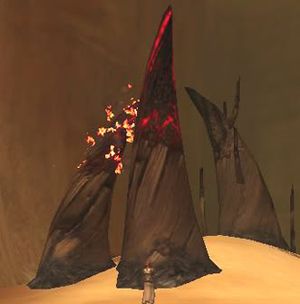From EncyclopAtys
m |
|||
| Line 1: | Line 1: | ||
| − | {{Lore Officielle}}<noinclude>{{Trad | + | {{Lore Officielle}}{{MobInfoBox |
| + | |image=Bothaya.jpg | ||
| + | |name=Bothaya | ||
| + | |king=Plants | ||
| + | |species=[[:Category:Singular plants|Pyrophilous]] [[:Category:Roots|root]] | ||
| + | |locale=[[Desert]] | ||
| + | |aggro= No | ||
| + | |damage=None | ||
| + | |}}<noinclude>{{Trad | ||
|DE=Bothaya | |DE=Bothaya | ||
| − | |DEs= | + | |DEs=1 |
|EN=Bothaya | |EN=Bothaya | ||
|ENs=4 | |ENs=4 | ||
| Line 11: | Line 19: | ||
|RUs=5 | |RUs=5 | ||
|H= | |H= | ||
| − | |palette=fyros}}</noinclude> | + | |palette=fyros}}</noinclude> |
| − | |||
| − | |||
| − | |||
| − | |||
| − | |||
| − | |||
| − | |||
| − | |||
| − | |||
| − | |||
| − | |||
| − | |||
The '''bothaya''', which most of the time resembles a horn emerging from the Bark, is not a tree but the visible part of a colony of plants. These develop into an intertwining of rhizomes that parasitise the underlying root which constitutes the Bark. Some botanists argue that, in fact, these plants enable the release of the excess heat from the heart of [[Atys]] in a process more symbiotic than parasitic. | The '''bothaya''', which most of the time resembles a horn emerging from the Bark, is not a tree but the visible part of a colony of plants. These develop into an intertwining of rhizomes that parasitise the underlying root which constitutes the Bark. Some botanists argue that, in fact, these plants enable the release of the excess heat from the heart of [[Atys]] in a process more symbiotic than parasitic. | ||
Revision as of 10:58, 27 August 2021
| Taxonomic Amber | |
| Bothaya | |
|---|---|

| |
| Kingdom | Plants |
| Category | Pyrophilous root |
| Main Ecosystem(s) | Desert |
| Counterattack type | None |
The bothaya, which most of the time resembles a horn emerging from the Bark, is not a tree but the visible part of a colony of plants. These develop into an intertwining of rhizomes that parasitise the underlying root which constitutes the Bark. Some botanists argue that, in fact, these plants enable the release of the excess heat from the heart of Atys in a process more symbiotic than parasitic.
The bothaya is, in fact, an active pyrophilic plant: it uses fire as a means of reproduction. Its especially thick and dense bark exhales flammable vapors which flare up under the effect of rising heat. The fire then spreads around and burns other plant species, thus ensuring bothaya dominance and expansion of its territory. The sharp summit therefore glows from spring to autumn, which begins the period of pollination that will only end at the end of winter.
The plant is then transformed and turns green again with broad green leaves that form a quiff. A bunch of deep purple inflorescences appears. These are actually not fruit but female flowers (when crushed, they crumble into a kind of fluff that the Fyros use to spin fibers). The male flowers are easily unnoticed: small, they grow on the ground while throwing intermittently clouds of orange pollen.
The bothaya is sacred to the Fyros who have always been fascinated by the fires it prompts. The Watchers are there to ensure that the forests of bothayas do not expand...




